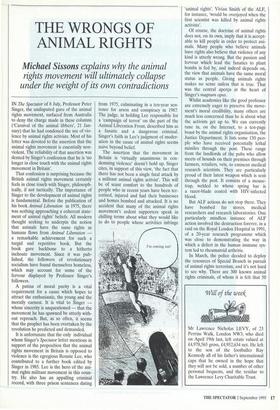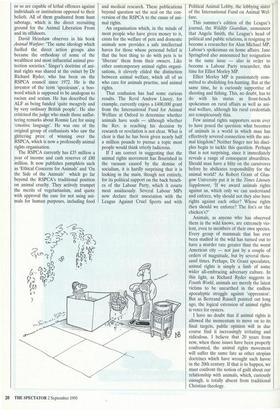THE WRONGS OF ANIMAL RIGHTS
Michael Sissons explains why the animal
rights movement will ultimately collapse under the weight of its own contradictions
IN The Spectator of 8 July, Professor Peter Singer, the undisputed guru of the animal rights movement, surfaced from Australia to deny the charge made in these columns ('Carnival of the animal libbers', 21 Jan- uary) that he had condoned the use of vio- lence by animal rights activists. Most of his letter was devoted to the assertion that the animal rights movement is essentially non- violent. The reliability of that assertion was dented by Singer's confession that he is `no longer in close touch with the animal rights movement in Britain'.
That confession is surprising because the British animal rights movement certainly feels in close touch with Singer, philosoph- ically, if not tactically. The importance of Singer to the development of animal rights is fundamental. Before the publication of his book Animal Liberation in 1975, there was nothing approaching a coherent state- ment of animal rights' beliefs. All modern thought seeking to underpin the notion that animals have the same rights as humans flows from Animal Liberation — a remarkable achievement for such a turgid and repetitive book. But the book gave backbone to a hitherto inchoate movement. Since it was pub- lished, the followers of revolutionary socialism have found themselves homeless, which may account for some of the fervour displayed by Professor Singer's followers.
A patina of moral purity is a vital requirement for a cause which hopes to attract the enthusiastic, the young and the morally earnest. It is vital to Singer — whose sincerity is unquestioned — that the movement he has spawned be utterly with- out reproach. But, as so often, it seems that the prophet has been overtaken by the revolution he predicted and demanded.
It is unfortunate that the only individual whom Singer's Spectator letter mentions in support of the proposition that the animal rights movement in Britain is opposed to violence is the egregious Ronnie Lee, who contributed to a further book edited by Singer in 1985. Lee is the hero of the ani- mal rights militant movement in this coun- try. He also has an appalling criminal record, with three prison sentences dating from 1975, culminating in a ten-year sen- tence for arson and conspiracy in 1987. The judge, in holding Lee responsible for a 'campaign of terror' on the part of the Animal Liberation Front, described him as a fanatic and a dangerous criminal. Singer's faith in Lee's judgment of moder- ation in the cause of animal rights seems naive beyond belief.
The assertion that the movement in Britain is 'virtually unanimous in con- demning violence' doesn't hold up. Singer cites, in support of this view, 'the fact that there has not been a single fatal attack by a militant animal rights activist'. This will be of scant comfort to the hundreds of people who in recent years have been ter- rorised, injured and had their businesses and homes bombed and attacked. It is no accident that many of the animal rights movement's ardent supporters speak in chilling terms about what they would like to do to people whose activities infringe 'animal rights'. Vivian Smith of the ALF, for instance, 'would be overjoyed when the first scientist was killed by animal rights activists'.
Of course, the doctrine of animal rights does not, on its own, imply that it is accept- able to kill people in order to protect ani- mals. Many people who believe animals have rights also believe that violence of any kind is utterly wrong. But the passion and fervour which lead the fanatics to plant bombs is fed by, and indeed depends on, the view that animals have the same moral status as people. Giving animals rights makes no sense unless that is true. That was the central apercu at the heart of Singer's magnum opus.
Whilst academics like the good professor are extremely eager to preserve the move- ment's moral credibility, many others are much less concerned than he is about what the activists get up to. We can currently tune in, on the Internet, to a ten-page boast by the animal rights organisation, the Justice Department. It lists some 150 peo- ple who have received potentially lethal missiles through the post. These range from the landlords of the pubs who allow meets of hounds on their premises through fanners, retailers, vets, to eminent medical research scientists. They are particularly proud of their latest weapon which is sent through the post. It consists of a mouse- trap, welded to whose spring bar is a razor-blade coated with HIV-infected blood.
But ALF actions do not stop there. They have bombed fur stores, medical researchers and research laboratories. One particularly mindless instance of ALF action involved the destruction forever, in a raid on the Royal London Hospital in 1991, of a 20-year research programme which was close to demonstrating the way in which a defect in the human immune sys- tem led to rheumatoid arthritis.
In March, the police decided to deploy the resources of Special Branch in pursuit of animal rights terrorism, and it's not hard to see why. There are 300 known animal rights criminals, of whom it is felt that 50 or so are capable of lethal offences against individuals or institutions opposed to their beliefs. All of them graduated from hunt sabotage, which is the direct recruiting ground for the Animal Liberation Front and its offshoots.
David Henshaw observes in his book Animal Warfare: The same ideology which fuelled the direct action groups also became the orthodoxy of some of the wealthiest and most influential animal pro- tection societies.' Singer's doctrine of ani- mal rights was shared at the outset by Dr Richard Ryder, who has been on the RSPCA council since 1972. He is the inventor of the term `speciesism', a boo- word which is supposed to be analogous to racism and sexism. He has described the ALF as being funded 'quite meagrely and by very ordinary British people'. He also criticised the judge who made those unflat- tering remarks about Ronnie Lee for using 'emotive language'. He was one of the original group of enthusiasts who saw the glittering prize of winning over the RSPCA, which is now a professedly animal rights organisation.
The RSPCA currently has £35 million a year of income and cash reserves of £80 million. It now publishes pamphlets such as 'Ethical Concerns for Animals' and 'On the Side of the Animals' which go far beyond the RSPCA's traditional position on animal cruelty. They actively trumpet the merits of vegetarianism, and quote with approval the case for not using ani- mals for human purposes, including food and medical research. These publications beyond question set the seal on the con- version of the RSPCA to the cause of ani- mal rights.
An organisation which, in the minds of most people who have given money to it, exists for the welfare of pets and domestic animals now provides a safe intellectual haven for those whose personal belief is that the best thing to do with pets is to 'liberate' them from their owners. Like other contemporary animal rights organi- sations, it cleverly elided the distinction between animal welfare, which all of us who care for animals practise, and animal rights.
That confusion has had some curious results. The Revd Andrew Linzey, for example, currently enjoys a £400,000 grant from the International Fund for Animal Welfare at Oxford to determine whether animals have souls — although whether the Rev, is reaching his decision by research or revelation is not clear. What is clear is that he has been given nearly half a million pounds to pursue a topic most people would think utterly ludicrous.
If I am correct in suggesting that the animal rights movement has flourished in the vacuum caused by the demise of socialism, it is hardly surprising that it is looking in the main, though not entirely, for its political support on the back bench- es of the Labour Party, which it courts most assiduously. Several Labour MPs now declare their association with the League Against Cruel Sports and with Political Animal Lobby, the lobbying sister of the International Fund on Animal Wel- fare.
This summer's edition of the League's journal, the Wildlife Guardian, announces that Angela Smith, the League's head of political and public relations, is resigning to become a researcher for Alun Michael MP, Labour's spokesman on home affairs. Jane Springford also announced her resignation in the same issue — also in order to become a Labour Party researcher, this time for Elliot Morley MP.
Elliot Morley MP is passionately com- mitted to abolishing fox-hunting. But at the same time, he is curiously supportive of shooting and fishing. This, no doubt, has to do with his status as front-bench spokesman on rural affairs as well as ani- mal welfare, although his rural credentials are conspicuously thin.
Few animal rights supporters seem ever to have posed the question: what becomes of animals in a world in which man has effectively severed connection with the ani- mal kingdom? Neither Singer nor his disci- ples begin to tackle this question. Perhaps that is not surprising, since it immediately reveals a range of consequent absurdities. Should man have a blitz on the carnivores before he abdicates responsibility for the animal world? As Robert Grant of Glas- gow University put it in the Times Literal), Supplement, 'If we award animals rights against us, which only we can understand and enforce, why should not they also have rights against each other? Whose rights then should we enforce? The fox's or the chicken's?'
Animals, as anyone who has observed them in the wild knows, are extremely vio- lent, even to members of their own species. Every group of mammals that has ever been studied in the wild has turned out to have a murder rate greater than the worst American city — not just by a couple of orders of magnitude, but by several thou- sand times. Perhaps, Dr Grant speculates, animal rights is simply a limb of some wider all-embracing adversary culture. In this light, as Richard Ryder suggests in Fourth World, animals are merely the latest victims to be unearthed in the endless apocalyptic struggle against 'oppression'. But as Bertrand Russell pointed out long ago, the logical extension of animal rights is votes for oysters.
I have no doubt that if animal rights is allowed the momentum to move on to its final targets, public opinion will in due course find it increasingly irritating and ridiculous. I believe that 20 years from now, when those issues have been properly confronted, the animal rights movement will suffer the same fate as other utopian doctrines which have wrought such havoc in the 20th century. If that is to happen, we must confront the notion of guilt about our relationship with animals, which, curiously enough, is totally absent from traditional Christian theology.



















































 Previous page
Previous page